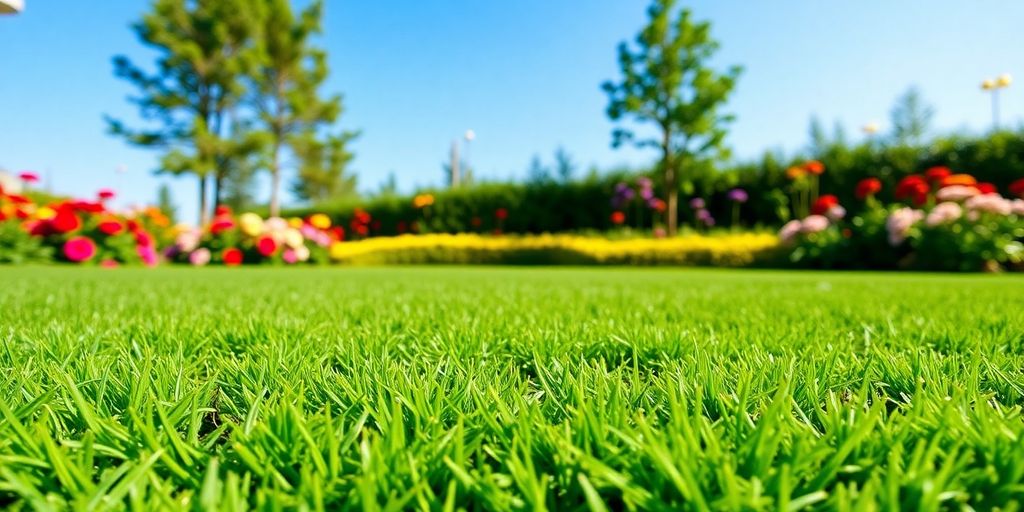If you’re looking to create a beautiful lawn, buying sod is a great way to start. This guide will help you understand the different types of sod, what to consider before purchasing, how to prepare your yard, and where to buy sod nearby. With the right information, you can transform your outdoor space into a lush paradise.
- Discover the Best Non Veg Food Near Me: A Culinary Adventure Awaits!
- Discovering Where to Get Semaglutide Near Me for Effective Weight Loss Solutions
- Discover the Best Sweets Shop Near Me: A Guide to Local Sweet Treats
- Discover What Are They Building Near Me: A Guide to Local Construction Projects
- Discover the Top Bar Cum Restaurant Near Me for an Unforgettable Dining Experience
Key Takeaways
- Choose the right type of sod based on your climate and yard conditions.
- Prepare your yard thoroughly before laying sod for the best results.
- Local garden centers and online retailers are great places to purchase sod.
- Follow proper installation techniques to ensure healthy growth.
- Regular care after installation will keep your lawn lush and green.
Understanding Different Types of Sod
When it comes to creating a beautiful lawn, choosing the right type of sod is essential. Different types of sod have unique characteristics that make them suitable for various climates and uses. Here’s a look at some of the most common types:
Bermuda Grass
Bermuda Grass is a popular choice for warm climates. It grows quickly and is very durable, making it ideal for lawns that experience a lot of foot traffic. This grass thrives in full sun and has a deep root system, which helps it resist drought.
Zoysia Grass
Zoysia Grass is known for its versatility. It can tolerate a range of sunlight and soil conditions, making it a great option for many homeowners. This type of grass is also durable and can handle foot traffic well, making it perfect for family yards.
St. Augustine Grass
St. Augustine Grass is best suited for warmer areas and does well in both sun and partial shade. It has broad blades and a rich green color, which adds beauty to any lawn. Additionally, it is resistant to pests and diseases, making it a low-maintenance option.
Kentucky Bluegrass
Kentucky Bluegrass is famous for its lush color and texture. It thrives in cooler climates and requires regular watering. This grass type is perfect for low-traffic areas, providing a beautiful and dense lawn.
| Grass Type | Best Climate | Sunlight Needs | Durability |
|---|---|---|---|
| Bermuda Grass | Warm | Full Sun | High |
| Zoysia Grass | Warm to Moderate | Varies | High |
| St. Augustine Grass | Warm | Sun/Partial Shade | Moderate |
| Kentucky Bluegrass | Cool | Full Sun | Moderate |


Understanding the types of sod available can help you make the best choice for your lawn. Each type has its own strengths and weaknesses, so consider your local climate and yard usage when selecting sod.
Factors to Consider When Choosing Sod
When selecting sod for your lawn, there are several important factors to keep in mind to ensure you make the best choice. These factors include climate, soil type, sunlight, and yard usage.
Climate Compatibility
The type of sod you choose should match your local climate. Some grasses thrive in warm weather, while others prefer cooler temperatures. Here’s a quick overview:
| Climate Type | Suitable Grass Types |
|---|---|
| Warm Climate | Bermuda, St. Augustine, Zoysia |
| Cool Climate | Kentucky Bluegrass, Fescue |
| Transition Zones | Tall Fescue, Zoysia |
Soil Type
Different grasses need different soil types to grow well. Testing your soil can help you understand its pH and texture. Here’s a simple guide:
- Sandy Soil: Bermuda, Centipede
- Clay Soil: Tall Fescue, Kentucky Bluegrass
- Loamy Soil: Almost all grass types
Sunlight Requirements
Read More : Where to Take Old Paint Near Me: The Ultimate Guide to Local Recycling Options
Grass types have varying needs for sunlight. Some need full sun, while others can grow in partial shade. Here’s a breakdown:
| Sunlight Exposure | Suitable Grass Types |
|---|---|
| Full Sun | Bermuda, Zoysia, Buffalo |
| Partial Shade | St. Augustine, Tall Fescue |
| Full Shade | Fine Fescue, Certain St. Augustine |
Yard Usage
How you plan to use your yard is also important. If your yard sees a lot of foot traffic or has pets, you’ll want a tougher grass type. Here are some options:
- High Traffic: Bermuda, Zoysia
- Low Traffic: Centipede, Fine Fescue
- General Use: Kentucky Bluegrass, Ryegrass
Understanding these factors will help you choose the right sod for your lawn, ensuring it thrives in your specific conditions.
By considering these elements, you can create a lush, green lawn that meets your needs and enhances your outdoor space.
Preparing Your Yard for Sod Installation
Once you’ve selected the right sod for your lawn, proper preparation is key to ensure it thrives. Here’s how to get your yard ready:
Clearing the Area
- Remove any weeds, rocks, and debris from the area where you will lay the sod. This helps the sod establish better root contact with the soil.
- Make sure the area is level to avoid water pooling.
- Check for any underground utilities before digging.
Soil Preparation
- Loosen the topsoil to a depth of about 6 inches. This allows the roots of the sod to penetrate easily.
- Consider adding compost or soil amendments to improve soil quality and pH levels.
- Test your soil to understand its texture and nutrient content.
Measuring and Ordering Sod
- Measure your yard to find out the total square footage needed. It’s wise to order a little extra (about 5-10%) to cover mistakes or irregular shapes.
- Use a measuring tape or a measuring wheel for accuracy.
- Keep in mind the type of sod you’re ordering, as different types may come in different sizes.
Timing
- The best time to lay sod is during the growing season, typically late spring through early fall. This ensures that the grass has enough time to establish roots before temperatures change significantly.
Preparing your yard properly can make a big difference in how well your sod grows. Taking these steps will help you achieve a lush, green lawn that you can enjoy for years to come!
Where to Buy Sod Near Me
Finding the right place to purchase sod is essential for achieving a lush lawn. Here are some great options:
Local Garden Centers
- Personalized Service: Staff can help you choose the best sod for your yard.
- Variety: Often carry multiple types of sod, including local favorites.
- Community Support: Buying local helps support your community.
Home Improvement Stores
- Convenience: Usually have a wide selection of sod and related supplies.
- One-Stop Shop: You can find everything from tools to fertilizers.
- Competitive Pricing: Often have sales and discounts.
Online Retailers
- Easy Comparison: You can compare prices and types from the comfort of your home.
- Home Delivery: Many offer delivery right to your door.
- Customer Reviews: Read feedback from other buyers to make informed choices.
Specialty Sod Farms
- Freshness: Sod is often harvested just before sale, ensuring quality.
- Expert Advice: Farmers can provide insights on the best sod for your area.
- Unique Varieties: May offer sod types not found in stores.
When choosing where to buy sod, consider factors like quality, price, and availability. Each option has its benefits, so pick what works best for your needs!
Tips for Installing Sod Successfully
Moisture and Soil Contact
Before you start laying down the sod, moisten the bed lightly with water. This helps the roots make good contact with the soil. It’s important to make the soil damp but not muddy.
Installation Technique
When you begin laying the sod, unroll it carefully. Start from the longest edge of your yard and lay the pieces in a straight line. Make sure the edges are close together without overlapping. This will help prevent gaps and ensure even growth.
Rolling the Sod
After you’ve laid all the sod, use a lawn roller to press it into the soil. This step is crucial as it helps eliminate air pockets and ensures good root-to-soil contact.
Initial Watering
Once the sod is laid, water it immediately. Keeping the sod consistently moist for the first two weeks is essential for helping the grass establish its roots.
Remember, taking the time to install your sod properly will lead to a healthier and more beautiful lawn in the long run!
Post-Installation Sod Care
Taking care of your sod after installation is essential for a healthy lawn. Here are some key points to keep in mind:
Watering Schedule
- Water daily for the first week to keep the sod moist.
- After the first week, reduce watering to every other day.
- Gradually scale back to twice a week as the sod establishes.
Mowing Guidelines
- Wait until the grass reaches about 3 inches before mowing for the first time.
- When mowing, avoid cutting more than one-third of the grass blade length to prevent stress on the sod.
Fertilizing Tips
- Once the sod is established, apply a balanced fertilizer to promote growth.
- Follow the instructions on the fertilizer package for the best results.
Remember, it’s essential that new sod is watered thoroughly. Soak upon installation as water is needed to keep your grass from drying out. The soil should be moist 3–4 inches deep to ensure proper root establishment.
By following these care tips, you can enjoy a lush, green lawn that enhances your home’s beauty.
Benefits of Using Sod for Your Lawn
Sod offers several advantages that make it a popular choice for homeowners looking to enhance their lawns. Here are some key benefits:
Instant Greenery
Read More : Discovering What is Open to Eat Near Me: A Guide to Local Dining Options
One of the biggest perks of using sod is that it provides instant greenery. Instead of waiting weeks for seeds to sprout, sod gives you a lush lawn right away.
Erosion Control
Sod is great for controlling erosion. It helps hold the soil in place, especially on slopes or near water. This is important for keeping your yard healthy and preventing soil loss.
Weed Reduction
Using high-quality sod can help reduce weeds. Since sod is dense and healthy, it crowds out many weeds that might otherwise take root.
Hydration Efficiency
Sod is also efficient when it comes to water. It needs less water to establish roots compared to seeding, which is a big plus in areas with water restrictions.
Summary of Benefits
| Benefit | Description |
|---|---|
| Instant Greenery | Immediate lush lawn without waiting for seeds. |
| Erosion Control | Helps prevent soil loss on slopes and near water. |
| Weed Reduction | Dense sod reduces the chance of weeds. |
| Hydration Efficiency | Requires less water to establish roots. |
Using sod can transform your yard quickly and effectively, making it a smart choice for homeowners.
In conclusion, the benefits of using sod for your lawn are clear. From instant greenery to effective erosion control, sod can help you achieve a beautiful and healthy lawn with less hassle.
Final Thoughts on Buying Sod
In conclusion, picking the right sod for your yard is key to having a beautiful lawn. Think about your local weather, the type of soil you have, how much sunlight your yard gets, and how you plan to use the space. With the right choice and some good care, you can create a lush green lawn that not only makes your home look great but also gives you a nice outdoor area to enjoy.
Frequently Asked Questions
What is sod and why should I use it?
Sod is grass that is grown on a farm and sold in rolls. It gives you an instant lawn, which means you don’t have to wait for seeds to grow.
How do I choose the right type of sod for my yard?
You should think about your local weather, the type of soil you have, how much sun your yard gets, and how you plan to use it.
How do I prepare my yard before putting down sod?
First, clear away any weeds or rocks. Then, loosen the soil and measure your yard to know how much sod to buy.
Where can I buy sod near me?
You can find sod at local garden centers, home improvement stores, or even order it online from specialty farms.
What should I do after I install the sod?
Make sure to water it daily for the first week. After that, you can water it less often as it starts to grow.
How often should I mow my new sod?
Wait until the grass is about 3 inches tall before mowing. When you do, only cut a little bit off the top.
Soure: https://herego.net
Category: near me


